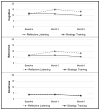Strategy Training During Inpatient Rehabilitation May Prevent Apathy Symptoms After Acute Stroke
- PMID: 25595665
- PMCID: PMC4466065
- DOI: 10.1016/j.pmrj.2014.12.010
Strategy Training During Inpatient Rehabilitation May Prevent Apathy Symptoms After Acute Stroke
Abstract
Background: Apathy, or lack of motivation for goal-directed activities, contributes to reduced engagement in and benefit from rehabilitation, impeding recovery from stroke.
Objective: To examine the effects of strategy training, a behavioral intervention used to augment usual inpatient rehabilitation, on apathy symptoms over the first 6 months after stroke.
Design: Secondary analysis of randomized controlled trial.
Setting: Acute inpatient rehabilitation.
Participants: Participants with acute stroke who exhibited cognitive impairments (Quick Executive Interview Scores ≥3) and were admitted for inpatient rehabilitation were randomized to receive strategy training (n = 15, 1 session per day, 5 days per week, in addition to usual inpatient rehabilitation) or reflective listening (n = 15, same dose).
Methods: Strategy training sessions focused on participant-selected goals and participant-derived strategies to address these goals, using a global strategy training method (Goal-Plan-Do-Check). Reflective listening sessions focused on participant reflections on their rehabilitation goals and experiences, facilitated by open-ended questions and active listening skills (attending, following, and responding).
Main outcome measures: Trained raters blinded to group assignment administered the Apathy Evaluation Scale at study admission, 3 months, and 6 months. Data were analyzed with repeated-measures fixed-effects models.
Results: Participants in both groups had similar subsyndromal levels of apathy symptoms at study admission (strategy training, mean = 25.79, standard deviation = 7.62; reflective listening, mean = 25.18, standard deviation = 4.40). A significant group × time interaction (F2,28 = 3.61, P = .040) indicated that changes in apathy symptom levels differed between groups over time. The magnitude of group differences in change scores was large (d = -0.99, t28 = -2.64, P = .013) at month 3 and moderate to large (d = -0.70, t28 = -1.86, P = .073) at month 6.
Conclusion: Strategy training shows promise as an adjunct to usual rehabilitation for maintaining low levels of poststroke apathy.
Copyright © 2015 American Academy of Physical Medicine and Rehabilitation. Published by Elsevier Inc. All rights reserved.
Figures



References
-
- Marin RS. Differential diagnosis and classification of apathy. Am J Psychiatry. 1990;147:22–30. - PubMed
-
- Marin RS. Apathy: a neuropsychiatric syndrome. J Neuropsychiatry. 1991;3:243–54. - PubMed
-
- Robert P, Onyike CU, Leentjens AFG, et al. Proposed diagnostic criteria for apathy in Alzheimer’s disease and other neuropsychiatric disorders. Eur Pschiatry. 2009;24:98–104. - PubMed
-
- Marin RS, Firinciogullari S, Biedrzycki RC. The sources of convergence between measures of apathy and depression. J Affect Disord. 1993;28:7–14. - PubMed
-
- van Reekum R, Stuss DT, Ostrander L. Apathy: why care? J Neuropsychiatry Clin Neurosci. 2005;17:7–19. - PubMed
Publication types
MeSH terms
Grants and funding
LinkOut - more resources
Full Text Sources
Other Literature Sources
Medical
Miscellaneous

